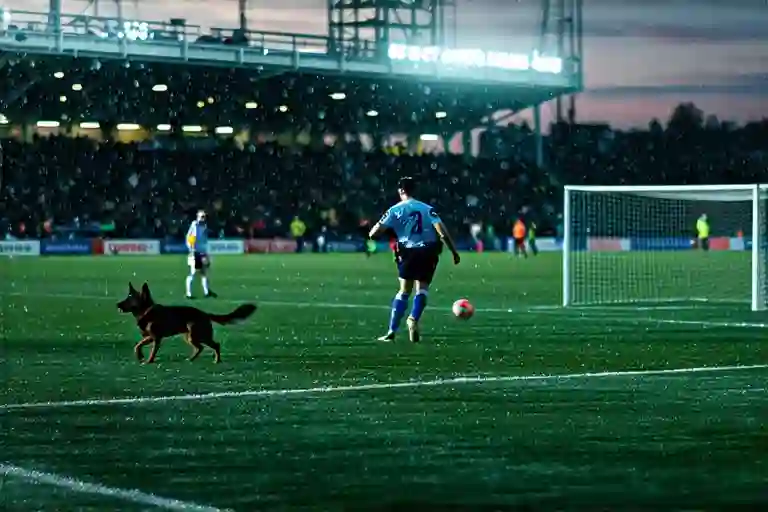The rain was coming down sideways at Plainmoor Ground that afternoon in May 1987, the kind of weather that makes you question why anyone would choose to play football in England. Torquay United, a small club languishing at the bottom of the Football League’s Fourth Division, were minutes away from relegation out of the professional leagues entirely. Their final match against Crewe Alexandra was slipping away, along with their future. Then, in a moment that defied all sporting logic, defender Jim McNichol found himself on the receiving end of an unexpected opponent – a police dog named Bryn that had escaped its handler.
That teeth-to-thigh encounter became the turning point no strategist could have predicted. The injury caused enough stoppage time for Torquay to score an equalizer, keeping them in the league by the thinnest possible margin. There were no trophies lifted that day, no parades through the seaside town. Just a ragtag group of players and supporters clinging to their place in the football pyramid by their fingernails – or more accurately, by a dog’s bite marks.
This peculiar episode, later featured in Netflix’s Losers, forces us to confront an uncomfortable question: When survival represents the absolute pinnacle of achievement, does that victory lose its meaning? Or does it perhaps mean more than we typically allow? In a world saturated with stories about underdogs who eventually dominate their fields, Torquay’s tale of barely avoiding disaster feels almost heretical. Their greatest triumph wasn’t climbing to the top – it was not falling off the bottom.
The beauty of this story lies in its glorious mundanity. While major clubs measure success in silverware and European campaigns, Torquay’s supporters celebrated something far simpler: another season of Saturday afternoon rituals, of shared struggles with their neighbors, of maintaining their small but sacred place in the football universe. The team’s value couldn’t be quantified by league tables or financial statements, but by the community that refused to let go – both literally, in the stands that day, and figuratively, across decades of supporting a perpetually struggling club.
This challenges our fundamental assumptions about what makes any endeavor worthwhile. We’ve been conditioned to view success as an upward trajectory, a series of ever-greater accomplishments building toward some definitive peak. But what if the most meaningful victories aren’t about scaling mountains, but about not tumbling into the abyss? What if simply maintaining your position – in sports, careers, relationships – represents an achievement we’ve foolishly taught ourselves to undervalue?
As I revisit Torquay’s story years later, what strikes me isn’t the absurdity of the dog incident (though that remains wonderfully bizarre), but the quiet dignity in their supporters’ persistence. Their version of success didn’t require global recognition or record-breaking feats – just the continuation of something they loved, against all reasonable odds. In an age where social media amplifies only the most extreme examples of achievement, perhaps we need more stories that celebrate the courage required to simply stay in the game.
The Absurd Victory: When a Dog Rewrote Sports History
The final minutes of Torquay United’s 1987 match felt less like a football game and more like a dark comedy script rejected for being too unbelievable. As the clock ticked toward what seemed certain relegation from the Football League, defender Jim McNichol found himself in a predicament no training session could prepare for – being bitten by a police dog that had strayed onto the pitch. The resulting injury stoppage gifted Torquay something more valuable than skill had earned them that season: extra time. And in those improbable added minutes, the struggling team scored the goal that preserved their league status.
This wasn’t the triumphant underdog story we’ve been conditioned to expect. There were no trophies lifted, no parades through Torquay’s seaside streets. Just a ragtag team that managed not to fail quite as catastrophically as they might have. Yet decades later, their story earns a spotlight in Netflix’s Losers not despite its lack of Hollywood ending, but because of it. The documentary recognizes what our success-obsessed narratives often miss: sometimes merely surviving the game deserves celebration.
What makes Torquay’s tale compelling isn’t the football – by all accounts, it was terrible that season. It’s everything surrounding the sport. The working-class fans who packed Plainmoor Stadium week after week, not because they expected victory, but because this team represented their community. The players who kept showing up despite knowing their names would never grace Premier League billboards. The absurd beauty of finding hope in a scenario where a police dog’s teeth become instruments of salvation.
In our era of highlight-reel athleticism and superstar salaries, Torquay’s 1987 season offers a counterpoint. Their value couldn’t be measured in league tables or goal differentials, but in the intangible ways they bound people together. When the final whistle blew on that bizarre match, the real victory wasn’t the scoreline – it was the proof that devotion needn’t be contingent on glory. That a team could be terrible on paper and still be loved. That sometimes success looks less like raising a cup and more like avoiding disaster by the skin of your teeth – or in this case, by the bite of a dog.
This brand of sports psychology rarely makes the inspirational posters. We prefer our underdogs to eventually become top dogs, our strugglers to transform into champions. But Torquay’s story invites us to consider a different metric – one where resilience matters more than results, where showing up counts as much as shining, and where avoiding the worst outcome can be its own quiet triumph. Their season didn’t produce champions, but it did produce character – both on the pitch and in the stands. And perhaps that’s the most authentic success any team, or any of us, can hope for.
The Algorithm’s Tyranny: How Silicon Valley Hijacked Our Definition of Success
We’ve all fallen down that rabbit hole – typing “inspirational failure stories” into search engines only to be greeted by the same polished pantheon of overachievers. Steve Jobs getting fired from Apple only to return in triumph. Oprah being told she wasn’t television material. Einstein’s teachers dismissing his potential. These stories have become the algorithmic equivalent of fast food: mass-produced, nutritionally questionable, and served with identical packaging.
There’s an unspoken violence to how these narratives colonize our imagination. When AI tools generate lists of “people who failed before succeeding,” they inevitably reinforce a narrow bandwidth of acceptable outcomes – usually involving fame, fortune, or paradigm-shifting innovation. The machine learning models feeding these results aren’t malicious; they’re simply mirroring our collective obsession with extreme outcomes. As researcher L.M. Sacasas notes, “Our technologies train us to see the world through their limitations.”
Consider the actual math behind these so-called inspirational tales:
- 92% of startup failures never produce a “pivot to success” story
- Only 0.0003% of aspiring actors reach Meryl Streep-level recognition
- The average scientific researcher publishes work that’s cited less than 10 times
Yet these statistical realities rarely surface in algorithmically generated content. The curation creates what psychologist Barry Schwartz calls “the paradox of choice meets the tyranny of exceptionalism” – we’re drowning in success stories that somehow still leave us feeling inadequate.
What makes this particularly insidious is how it warps our perception of everyday resilience. When my neighbor Sarah talks about keeping her small bookstore alive through the pandemic, she prefaces it with “It’s not some big success story…” That reflexive dismissal mirrors how our tools have trained us to devalue survival as an achievement. The same algorithms that surface 47 variations of “How J.K. Rowling Went From Welfare to Wealth” won’t highlight the teacher who’s shown up for twenty years of underfunded classrooms.
This isn’t just about hurt feelings – it has tangible consequences. A 2022 Cambridge study found that exposure to “extreme success narratives” correlated with:
- 23% increase in imposter syndrome
- 18% drop in satisfaction with incremental progress
- 31% higher likelihood to abandon long-term projects
The irony? Many canonical success stories are themselves distortions. That famous “Einstein failed math” legend? Pure fabrication. The polished startup pivot narrative? Usually omits years of silent struggle. We’re comparing our raw footage to someone else’s highlight reel curated by an algorithm designed to maximize engagement, not truth.
Perhaps the most subversive thing we can do is to consciously seek out stories that algorithms don’t prioritize – like Torquay United’s dog-bite salvation. Or the Wisconsin nurse who considers her career successful because she “never let a patient feel alone.” Or the millions of quiet victories that will never trend on LinkedIn but sustain the actual fabric of human society.
Because here’s what the AI won’t tell you: success isn’t a mountain with one summit. It’s more like a archipelago – countless islands of meaning waiting to be discovered, if only we’d stop staring at the same three over-photographed peaks.
Drawing Your Success Spectrum: From Pyramid to Rainbow Bridge
We’ve been conditioned to see success as a singular peak – the corporate ladder’s top rung, the championship trophy, the viral fame. But what if we visualized it instead as a spectrum of colors, each representing a different dimension of fulfillment? The Torquay United story cracks open this possibility, showing how survival itself can be a victory when viewed through the lens of community and perseverance.
Take Martin, a graphic designer who runs marathons in the 4:30-5:00 hour range. By conventional athletic standards, he’s mediocre at best. Yet every finish line represents months of predawn training through Chicago winters, the quiet triumph of outlasting three knee surgeries. His training spreadsheet doesn’t track podium placements, but rather consistency streaks and the joy of showing up. When asked about his running ‘success,’ he grins: “I’ve got a 100% finish rate for post-race beers with my crew.”
Then there’s Priya, who left her PhD program to start a neighborhood compost collective. There are no Ted Talks about her work, no seven-figure grants. Just 37 families diverting food waste from landfills each week, and the satisfaction of turning coffee grounds into community connections. Her metric? “Seeing Mr. Thompson, our oldest volunteer, teach teenagers about worm bins.”
These stories reveal the limitations of our success vocabulary. We lack words for the graduate who finds meaning in tutoring rather than tenure-track positions, or the entrepreneur who measures growth by employee well-being rather than valuation. The spectrum framework helps here:
- Vitality Axis (Physical/Mental Health): Small wins like sticking to therapy appointments or cooking nourishing meals
- Connection Axis (Relationships): Being present at a child’s recital or maintaining long-distance friendships
- Purpose Axis (Work/Contribution): Completing a passion project or mentoring newcomers
- Discovery Axis (Learning/Growth): Mastering a chord progression or understanding personal boundaries
The beauty of this model lies in its flexibility. Your spectrum might prioritize creative expression over career advancement, or value spiritual exploration more than social media metrics. Unlike rigid hierarchies, it accommodates life’s seasons – recognizing that a new parent’s spectrum temporarily contracts toward survival, or that retirement brings opportunity to rediscover neglected dimensions.
Corporate trainer Jamal uses this approach with burnt-out clients: “We map their current energy distribution across the axes, then compare it to their ideal allocation. Often, just naming these imbalances relieves the pressure to perform in areas that don’t truly matter to them.”
This isn’t about rejecting conventional achievements, but about contextualizing them. That promotion still belongs on your spectrum – just alongside your ability to unplug during vacations, or the homemade birthday cake you finally didn’t burn. As author Parker Palmer observes: “Violence is done when we try to fit our lives into a single category called success.”
Your spectrum won’t look like anyone else’s, and that’s the point. The Torquay players didn’t need Premier League glory to feel their season mattered. Like them, we’re allowed to celebrate staying in the game – whatever that game may be – with all its messy, unphotogenic, dog-bitten perseverance.
Celebrating Small Wins: A Practical Guide
Most success manuals would have you believe achievement only counts if it’s Instagram-worthy – the promotion, the six-figure launch, the viral moment. But what about the quiet victories that actually sustain us? The mornings you dragged yourself out of bed despite depression’s gravitational pull. The year you kept that struggling book club alive just because Mrs. Thompson looked forward to it. These aren’t plot points in some heroic biopic – they’re the unglamorous glue holding human resilience together.
Tool 1: The ‘Ugly Beautiful’ Achievement Journal
Forget productivity porn. Try this instead: Every Sunday evening, scribble down three things that felt like personal milestones, no matter how bizarre or boring by conventional standards:
- The Mundane Miracle: “Finally cleaned the fridge after 6 months of pretending not to see that science experiment in the vegetable drawer.”
- The Emotional Marathon: “Attended my nephew’s recital without crying about my own failed piano dreams.”
- The Invisible Labor: “Resisted sending that 3am rage email to my landlord – victory via delete button.”
The magic happens when you review these entries quarterly. Patterns emerge: maybe your real superpower isn’t hustle culture’s definition of ‘crushing goals’ but being the emotional anchor your friends rely on during crises. That’s not failure – that’s an entirely different scoring system.
Tool 2: Crafting Your Personal Success Metrics
Society’s report card measures salary, job titles, and square footage. Time to design your own grading rubric. Ask:
- What made 8-year-old me feel proud? (Building blanket forts > standardized test scores)
- When do I feel ‘rich’ without spending money? (Your best friend’s laugh during 2am pancake runs)
- What minor act takes disproportionate courage for me? (For some, it’s public speaking; for others, simply leaving the house)
- Who benefits from my ordinary efforts? (The barista who lights up when you remember her dog’s name)
- What would I regret not doing if life ended next week? (Probably not ‘checking more emails’)
This isn’t anti-ambition – it’s precision targeting. When a client told me her ‘success metric’ was helping hospice patients die without pain, no corporate ladder could measure that dignity. Yet our culture would call her ‘just a nurse.’
The Torquay Principle
Remember that ragtag football team saved by a dog bite? Their victory wasn’t about trophies but community survival. Your version might look like:
- Getting through a family dinner without old wounds reopening
- Writing one honest paragraph after years of creative block
- Choosing rest over guilt for the first time
These don’t belong in LinkedIn bullet points. They belong in the private museum of your resilience. So start curating.
Your move: This week, declare one ‘irrational’ win. Maybe you finally separated the Lego from the laundry. Perhaps you didn’t check work Slack on vacation. However small, however silly – name it, claim it, then notice how these add up to something algorithms will never understand: a life actually lived.
The Beauty of Unremarkable Victories
The story of Torquay United’s improbable survival in 1987 doesn’t fit neatly into our cultural obsession with dramatic underdog stories. There was no trophy lifted, no championship parade – just a lower-league football club narrowly avoiding relegation because a defender got bitten by a police dog. Yet this messy, unglamorous moment captures something more profound about redefining success than any polished Silicon Valley origin story ever could.
Success isn’t always about breakthrough moments or radical transformations. Sometimes it’s simply about showing up when the odds are stacked against you, about communities rallying around something they love regardless of its market value. The Torquay supporters who packed the stands that season weren’t there because they expected glory – they were there because this scrappy team represented something real about their town and their lives.
We’ve been conditioned to measure our worth against algorithmic versions of success – the kind that gets turned into inspirational LinkedIn posts or TED Talks. The internet floods us with sanitized failure-to-success arcs featuring the usual suspects: Jobs, Musk, Oprah. But these extreme examples create what psychologists call a ‘reference bias,’ making our own modest achievements feel insignificant by comparison.
What if we measured differently? What if success looked like:
- The single parent who manages to read bedtime stories despite exhaustion
- The amateur musician playing local pubs for the love of it
- The small business that breaks even but becomes a neighborhood hub
These are the victories that form the fabric of meaningful lives, yet they rarely make it into our success narratives. The Torquay story matters precisely because it’s not extraordinary – it’s a testament to the quiet resilience that defines most human endeavor.
Here’s an invitation: share your #MyTinyWin this week. Not the Instagrammable milestone, but the real, unvarnished moment that felt like victory to you. Maybe it was finishing a project that no one will applaud, or simply getting out of bed on a hard day. As the Torquay fans understood, sometimes success isn’t about reaching the top – it’s about refusing to disappear.
“Perhaps real victory is like Torquay’s – being life’s underdog, getting bitten, and still finding a way to play through stoppage time.”



